|
|
|
Sort Order |
|
|
|
Items / Page
|
|
|
|
|
|
|
| Srl | Item |
| 1 |
ID:
172647
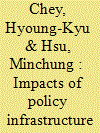

|
|
|
|
|
| Summary/Abstract |
Despite burgeoning research on the internationalization of the Chinese renminbi, there has been surprisingly little systematic analysis of how the renminbi is actually used in foreign markets. This study provides a cross-country analysis of renminbi use in offshore foreign exchange markets, with special attention to the effects of the cooperative policy measures adopted by China and foreign states to promote the renminbi’s international use. We find that a country’s participation in the Renminbi Qualified Foreign Institutional Investor scheme (which expands its renminbi investment opportunities) and its establishment of an offshore renminbi clearing bank (which provides better renminbi payment services), but not its entry into a renminbi–local currency swap agreement, facilitate use of the renminbi in its foreign exchange markets. States have played a significant role in the rise of the renminbi as a newly internationalizing currency.
|
|
|
|
|
|
|
|
|
|
|
|
|
|
|
|
| 2 |
ID:
111595
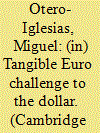

|
|
|
|
|
| Publication |
2012.
|
| Summary/Abstract |
The main purpose of this article is to shift the dollar vs Euro debate away from US-EU centrism to perspectives from emerging markets. Drawing on 40 semistructured financial elite interviews in Brazil and China, the key research question studied here is whether the US dollar is malfunctioning as the leading international currency in these parts of the world, and, if so, whether the Euro can be an alternative to the greenback. The results show that the status of the dollar as the main anchor in the monetary system is seriously questioned among financial elites in China and Brazil. As yet, though, the Euro does not represent an alternative to the dollar because of its fiscal and political fragmentations. However, despite these institutional shortcomings, the European currency is seen as an ideational role model for super-sovereign monetary integration out of dollar unipolarity based on consensual negotiations not only on a regional, but also on a global scale.
|
|
|
|
|
|
|
|
|
|
|
|
|
|
|
|
| 3 |
ID:
127055
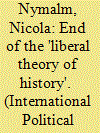

|
|
|
|
|
| Publication |
2013.
|
| Summary/Abstract |
Over the last 10 years, economic issues related to currency policy have become the major ongoing dispute between China and the United States. Specifically, the US Congress has demanded a tougher policy to avert the negative consequences of "unfair" Chinese policies-in the form of a "manipulated currency"-for the US economy. Building on an analytical framework of discourse theory (DT)-and proposing a method for applying DT in empirical research-an investigation into congressional debates on the Chinese currency shows that the question is not a purely economic one, but rather that it reflects a dislocation of US identity as the vanguard of liberal-democratic capitalism. This dislocation involves changes to how "liberal" identity in the US Congress is articulated in relation to the role attributed to "illiberal" China, which in turn affects the formulation of US China policy in Congress.
|
|
|
|
|
|
|
|
|
|
|
|
|
|
|
|
| 4 |
ID:
125409
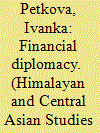

|
|
|
|
|
| Publication |
2013.
|
| Summary/Abstract |
China is the world's biggest exporter since 2009 and the second largest economy since 2010.after achieving these high levels of inclusion into the global economy and trade in could be expected for the national currency (the Chinese Yuan) to find international demand. However, the still developing financial system and the currency control regime are key obstacles for this demand to evolve.
|
|
|
|
|
|
|
|
|
|
|
|
|
|
|
|
| 5 |
ID:
138451
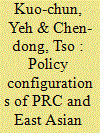

|
|
|
|
|
| Summary/Abstract |
This article predicts future policy configurations of PRC (People’s Republic of China) and East Asian emerging economies using Mundell’s trilemma and its quantitative measurement. Due to fear of capital flows and exchange-rate volatility, the East Asian emerging economies may still choose a collective exchange rate stability mechanism, which constitutes exchange rate stability, monetary independence, and limitation on capital flows with the support of precautious reserve accumulation and multilateral currency swaps. That is, a Bretton Woods-style mechanism will still be feasible after the global financial crisis. On the other hand, East Asia may be willing to decrease precautious reserve accumulation once a new international currency can be launched. However, the PRC’s attitude will be the critical factor.
|
|
|
|
|
|
|
|
|
|
|
|
|
|
|
|
| 6 |
ID:
155160
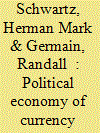

|
|
|
|
|
| Summary/Abstract |
The rise of China has sparked a debate about the economic and political consequences for the global economy of the internationalisation of the renminbi. We argue that the dominant focus of this literature – primarily the external conditions and requirements for a national currency to become an international currency – misspecifies the connections between the international and domestic requirements for currency internationalisation, as well as the potential to become the dominant international reserve currency. We correct this oversight by developing an integrated theoretical framework that highlights the domestic adjustment costs which a state must accommodate before its currency can carry the weight of internationalisation. These costs constitute a critical element of an international currency’s ‘political economy’, and they force states to negotiate contentious social trade-offs among competing domestic claims on finite public resources in a sustainable manner. Our analysis suggests that the likelihood of China being able to successfully negotiate the social costs associated with running a fully internationalised currency is currently very low, precisely because this will place unacceptable pressure on groups benefiting from the economic and political status quo. This further suggests that the American dollar will remain unchallenged as the global economy’s pre-eminent international currency for the foreseeable future.
|
|
|
|
|
|
|
|
|
|
|
|
|
|
|
|
| 7 |
ID:
120837
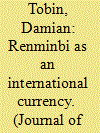

|
|
|
| 8 |
ID:
138897
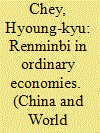

|
|
|
|
|
| Summary/Abstract |
Most studies of renminbi internationalization focus on the supply side, by examining China's own economic and political conditions. In contrast, this study addresses the demand side of renminbi internationalization, by providing an in-depth analysis of renminbi use in ordinary foreign economies from both economic and political perspectives, with a particular focus on South Korea, China's next-door neighbor. The study finds that sustainable indigenous market forces facilitating renminbi use in South Korea remain weak, despite the country's close economic ties with China. This research also shows, however, that the Korean Government has itself recently been able, through its policy measures, to generate new domestic support for greater use of the renminbi. These findings ultimately highlight the significant impact on the internationalization of a currency of the politics in the foreign countries using it.
|
|
|
|
|
|
|
|
|
|
|
|
|
|
|
|
| 9 |
ID:
152516
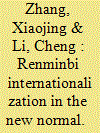

|
|
|
|
|
| Summary/Abstract |
In the present paper we explore the internationalization of the renminbi with reference to the experiences of other monetary powers, and discuss its determinants, prospects and implications for China's development in the “new normal.” Specifically, after summarizing the major progress made thus far, we conduct a regression analysis, showing that economic size and financial conditions are significant determinants of the international currency status, while inertia and other unobserved factors also play important roles. These empirical findings enable us to undertake a scenario analysis focusing on the renminbi's potential to become a global reserve currency. Based on this quantitative research, we then revisit China's policy initiatives designed to promote its currency overseas. In our view, the internationalization of the renminbi, along with financial deepening and liberalization, should be regarded as a means to achieve China's goal of reaching a more sustainable and balanced model of development.
|
|
|
|
|
|
|
|
|
|
|
|
|
|
|
|
| 10 |
ID:
101864
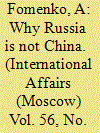

|
|
|
|
|
| Publication |
2010.
|
| Summary/Abstract |
EAST ASIA moved into economic limelight as soon as the Soviet Union left the scene. By 1993, Japanese banks had accumulated half of the assets of the world's 500 largest banks; it even looked, at least to some of the experts, that New York lost its old role of an arbiter and manager of the financial markets.
|
|
|
|
|
|
|
|
|
|
|
|
|
|
|
|
|
|
|
|
|